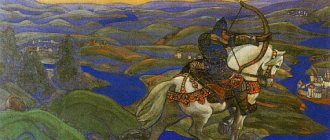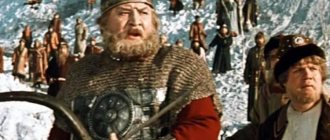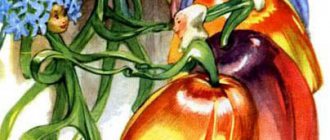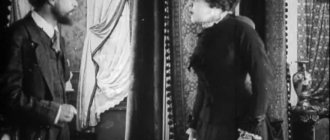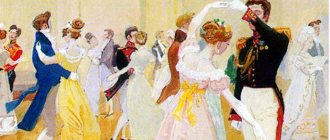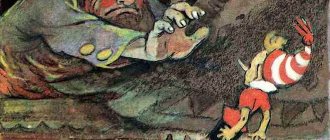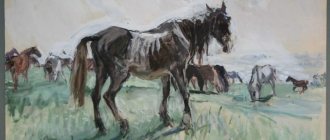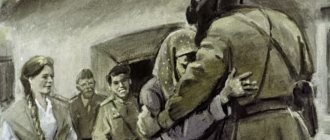“Ilya Muromets” very brief summary
A. K. Tolstoy “Ilya Muromets” summary for the reader’s diary:
The poem “Ilya Muromets” is very short in content. It describes how Ilya rides his faithful horse through the forest and talks about Vladimir.
It is clear that he is upset, Vladimir does not show him due respect, does not remember his past achievements, now young heroes are held in high esteem. But Ilya is wise, he understands that if there is trouble, he will definitely come to the rescue and defend his homeland, although of course the prince is wrong.
The main idea:
You should not forget all the good things that people have done to you, you must treat past merits with due respect, because in the future these people can still be very useful to you.
This is interesting: A short retelling of “Bezhin Meadow” by Turgenev with conclusions.
ILYA MUROMETS AND KALIN-TSAR
Prince Vladimir started an honorable feast and did not invite Ilya of Muromets. The hero was offended by the prince; He went out into the street, pulled a tight bow, began to shoot at the silver church domes, at the gilded crosses and shouted to the Kyiv peasants: “Collect the gilded crosses and silver church domes, bring them to the circle - to the drinking house. Let’s start our own feast for all the men of Kyiv!”
Prince Vladimir of Stolno-Kiev became angry and ordered Ilya of Muromets to be imprisoned in a deep cellar for three years.
And Vladimir’s daughter ordered the keys to the cellar to be made and, secretly from the prince, she ordered the glorious hero to be fed and watered, and sent him soft feather beds and down pillows.
How much time has passed, a messenger from Tsar Kalin galloped to Kyiv. He swung the doors wide open, ran into the prince’s tower without asking, and threw a messenger letter to Vladimir. And in the letter it is written: “I order you, Prince Vladimir, to quickly clear the Streltsy streets and large princely courtyards and supply foamy beer, standing mead and green wine throughout all the streets and alleys, so that my army will have something to treat themselves to in Kyiv. If you don’t follow the order, you have yourself to blame. I will shake Rus' with fire. I will ruin the city of Kyiv and put you and the princess to death. I give three days.”
Prince Vladimir read the letter, sighed, and became sad. He walks around the room, sheds burning tears, wipes himself with a silk scarf:
- Oh, why did I put Ilya Muromets in a deep cellar and ordered that cellar to be filled with yellow sand! Guess what, our defender is no longer alive? And there are no other heroes in Kyiv now. And there is no one to stand up for the faith, for the Russian land, no one to stand up for the capital city, to defend me with the princess and my daughter!
- Father-Prince of Stolno-Kiev, don’t order me to be executed, let me say a word,” said Vladimir’s daughter. Our Ilya Muromets is alive and well. I secretly gave him water, fed him, and looked after him. Forgive me, my unauthorized daughter!
- You’re smart, you’re smart,” Vladimir the prince praised his daughter.
He grabbed the key to the cellar and ran after Ilya Muromets. He brought him to the white stone chambers, hugged and kissed the hero, treated him to sugar dishes, gave him sweet overseas wines, and said these words:
- Don't be angry. Ilya Muromets! Let what happened between us grow into reality. Misfortune has befallen us. The dog Tsar Kalin approached the capital city of Kyiv and brought countless hordes. He threatens to ruin Rus' and destroy it with fire. To destroy the city of Kyiv, to overwhelm all the people of Kiev, but today there are no heroes. Everyone is standing at the outposts and gone on the road. I have all my hope in you alone, glorious hero Ilya Muromets!
Ilya Muromets has no time to chill out and treat himself at the princely table. He quickly went to his yard. First of all, I checked on my prophetic horse. The horse, well-fed, sleek, well-groomed, neighed joyfully when it saw its owner.
1 page, 459 words
Description based on Roerich’s painting “Ilya Muromets”
... gives the picture a mood of peace and tranquility. The horse of Ilya Muromets dilutes it with a large snow-white spot. The white color of the horse as a symbol of purity and light emphasizes the inner essence of the rider, full of pure... canvases of the series - “Ilya Muromets”. The paintings preserved by the people during wartime became part of their life, part of their future, for which the artist worked. Did you like the essay? And here's another:
Ilya Muromets said to his parobku [14]:
- Thank you for taking care of the horse! And he began to saddle the horse. First, he put on a sweatshirt, and on the sweatshirt he put felt, and on the felt, an incontinent Cherkassy saddle. He pulled up twelve silk girths with damask pins, with red gold buckles, not for beauty, for pleasure, for the sake of heroic strength: silk girths stretch and do not tear, damask steel bends and does not break, and red gold buckles do not rust. Ilya himself also equipped himself with heroic battle armor. He had a damask club with him, a long spear, he belted a combat sword, grabbed a traveling shawl [15] and rode out into the open field. He sees that there are many Tatar forces near Kiev. From the cry of men and from the neighing of horses, the human heart becomes sad. Wherever you look, you can’t see the end of the enemy hordes of power.
Ilya Muromets rode out, climbed a high hill, looked towards the east and saw white linen tents far, far away in an open field. He directed there, urged the horse, and said: “Apparently, our Russian heroes are standing there, they don’t know about the misfortune.”
And soon he drove up to the white linen tents and entered the tent of the greatest[16] hero Samson Samoilovich, his godfather. And the heroes were having lunch at that time. Ilya Muromets said:
- Bread and salt, holy Russian heroes!
Samson Samoilovich answered:
- Come on, perhaps, our glorious hero Ilya Muromets! Sit down to dine with us, taste some bread and salt!
Here the heroes stood up on their brisk feet, greeted Ilya Muromets, hugged him, kissed him three times, and invited him to the table.
- Thank you, brothers of the cross. “I didn’t come for dinner, but brought gloomy, sad news,” said Ilya Muromets. – There is an army near Kiev – a countless force. The dog Kalin the Tsar is threatening to take and burn our capital city, to cut down all the Kyiv men, to drive away wives and daughters, to destroy churches, to put Prince Vladimir and Princess Apraxia to an evil death. And I came to invite you to fight with your enemies!
The heroes responded to those speeches:
“We, Ilya Muromets, will not saddle our horses, we will not go and fight for Prince Vladimir and Princess Apraxia.” They have many close princes and boyars. The Grand Duke of Stolno-Kiev waters and feeds them and favors them, but we have nothing from Vladimir and Apraxia Korolevichna. Don't persuade us, Ilya Muromets!
Ilya Muromets did not like those speeches. He mounted his good horse and rode up to the enemy hordes. He began to trample the enemy's strength with his horse, stab him with a spear, chop it with a sword, and beat him with a road shawl. It hits and hits tirelessly. And the heroic horse under him spoke in human language:
- You cannot beat the enemy forces, Ilya Muromets. Tsar Kalin has mighty heroes and brave clearings[17], and deep trenches have been dug in the open fields. As soon as we sit in the tunnels, I’ll jump out of the first tunnel, and I’ll jump out of the other tunnel and carry you out, Ilya, and even if I jump out of the third tunnel, I won’t be able to carry you out.
1 page, 480 words
Description based on Bilibin’s painting “Ilya Muromets and Svyatogor”
... with the epic the artist focuses on the colossal advantage in strength of one of the heroes. Svyatogor’s gigantic height reaches to the skies, and clouds fall on his shoulders. The horse is a match for the hero. Ilya Muromets more... folk ornaments put the drawing among the best examples of the genre of fairy-tale illustration. Did you like the essay? And here's another:
Ilya did not like those speeches. He picked up a silk whip, began to hit the horse’s steep hips, and said:
- Oh, you traitor dog, wolf meat, grass bag! I feed you, sing you, take care of you, and you want to destroy me!
And then the horse with Ilya sank into the first tunnel. From there the faithful horse jumped out and carried the hero on his back. And again the hero began to beat the enemy’s force, like mowing grass. And another time the horse with Ilya sank into a deep tunnel. And from this tunnel a fast horse carried the hero.
Ilya Muromets beats the Tatars and says:
- Don’t go yourself and order your children and grandchildren to go and fight in Great Rus' forever and ever.
At that time, he and his horse sank into the third deep tunnel. His faithful horse jumped out of the tunnel, but he could not bear Ilya Muromets. The Tatars came running to catch the horse, but the faithful horse did not give in, it galloped far into an open field. Then dozens of heroes, hundreds of warriors attacked Ilya Muromets in a tunnel, tied him up, shackled his arms and legs and brought him to the tent to Tsar Kalin. Tsar Kalin greeted him kindly and affably and ordered him to untie and unchain the hero:
- Sit down, Ilya Muromets, with me, Tsar Kalin, at the same table, eat whatever your heart desires, drink my honey drinks. I will give you precious clothing, I will give you, as needed, the golden treasury. Do not serve Prince Vladimir, but serve me, Tsar Kalin, and you will be my neighbor prince-boyar!
Ilya Muromets looked at Tsar Kalin, grinned unkindly and said:
“I won’t sit with you at the same table, I won’t eat your dishes, I won’t drink your honey drinks, I don’t need precious clothes, I don’t need countless golden treasuries. I will not serve you - the dog Tsar Kalin! And from now on I will faithfully defend, defend Great Rus', stand for the capital Kyiv City, for my people and for Prince Vladimir. And I’ll also tell you: you’re stupid, dog Kalin the Tsar, if you think you’ll find traitorous defectors in Rus'!
He swung the carpet door wide open and jumped out of the tent. And there the guards, the royal guards, fell like clouds on Ilya Muromets: some with shackles, some with ropes - they were trying to tie and shackle the unarmed.
No such luck! The mighty hero strained himself, strained himself: he scattered and scattered the infidel and jumped through the enemy’s army into an open field, into a wide expanse.
He whistled with his heroic whistle and, out of nowhere, his faithful horse came running with armor and equipment. Ilya Muromets rode out onto a high hill, pulled his bow tight and sent a red-hot arrow, he himself said: “You fly, red-hot arrow, into the white tent, fall, arrow, onto the white chest of my godfather, slip and make a small scratch. He will understand: it can be bad for me alone in battle.” An arrow hit Samson's tent.
Samson the hero woke up, jumped up on quick feet and shouted in a loud voice:
- Arise, mighty Russian heroes! A red-hot arrow arrived from his godson - sad news: he needed help in a battle with the Saracens. It would have been in vain that he would not have sent the arrow. Saddle up good horses without delay, and we will go to fight not for the sake of Prince Vladimir, but for the sake of the Russian people and to the rescue of the glorious Ilya Muromets!
Soon twelve heroes came to the rescue, and Ilya Muromets was with them in the thirteenth. They attacked the enemy hordes, beat them down, trampled under their horses all their countless forces, captured Tsar Kalin himself, and brought him to the chambers of Prince Vladimir. And King Kalin said:
- Don’t execute me, Prince Vladimir of Stolno-Kiev, I will pay you tribute and will order my children, grandchildren and great-grandchildren for eternal centuries not to go to Rus' with a sword, but to live with you in peace. We will sign the document.
Here the old epic ended, the blue sea for silence, and good people for obedience.
A short retelling of “Ilya Muromets”
Summary of “Ilya Muromets” by Tolstoy:
Despite the fact that Ilya Muromets was one of the best heroes of the sovereign, conflicts arose between him and the prince, this is narrated in the epics of Ancient Rus'. Tolstoy also mentions that Vladimir carried a charm past Ilya during the feast, thus failing to show due respect.
However, the hero is not very worried about this case. He is not a courtier and above all else he respects not the luxury of the princely court, but the independence and breadth of his land, the one that he protects and protects from enemies.
Ilya is driving through the forest. His horse is crushing ferns. He left Kyiv and is now grumbling displeasedly about how Prince Vladimir will live without him. The hero does not regret the feasts taking place at court. After all, he is an ordinary Russian peasant, capable of getting by on a piece of bread. Nevertheless, Vladimir showed Muromets his disrespectful attitude by casting a spell on him at the feast.
The hero is not ready to put up with this, so he left. The prince has plenty of other heroes; they also like court feasts and women. Still, they are young, and Ilya is already old and has long ago “forgotten the women,” but in battle, as before, he has no equal. Smirking, he notices that he does not suit Vladimir’s court at all and says that “it’s time to walk around the world again.”
Feeling uncomfortable in luxurious houses, he ironically notes that a simple person from a peasant background, who is accustomed to an ordinary life, gets a headache from the smoking of Constantinople. In the city he can’t breathe, but the wide, spacious steppes, which remind him of freedom and independence, are closer to him. And he likens Kyiv to a stuffy screen (chest).
Thinking about expanse, the hero perked up and became cheerful. Among the dark forest, smelling of resin and berries, Ilya feels in his own environment, surrounded by boundless freedom.
Conclusion:
Ilya in A.K. Tolstoy’s poem appears wiser and more restrained, he does not give vent to anger, does not splash out destructive force, but comes to the conclusion that, having lost his service, he gains much more - freedom.
Dobrynya Nikitich is the second most important hero of the Kyiv epic cycle. In the epic “Dobrynya and the Serpent” he performs a feat of arms - he defeats the Serpent, who brought a lot of grief to the Russian land. We recommend reading a summary of “Dobrynya and the Serpent” for the reading diary and preparation for a literature lesson. The plot of the epic comes from ancient fairy-tale folklore.
ILYA MUROMETS AND THE POGANY IDOL
Once Ilya Muromets left far from Kyiv into an open field, into a wide expanse. I shot geese, swans and gray ducks there. On the way, he met Elder Ivanishche, a walking Kalika. Ilya asks:
- How long have you been from Kyiv?
Recently I was in Kyiv. Prince Vladimir and Apraxia are in trouble there. There were no heroes in the city, and the filthy Idolishche arrived. He is as tall as a haystack, with eyes like cups, with slanting fathoms in his shoulders[10].
Lounging, he sits in the princely chambers, helps himself, shouts at the prince and princess: “Give me this, and bring this!” And there is no one to defend them.
- Oh, you, elder Ivanishche,” says Ilya Muromets, “you’re sturdier and stronger than me, but you don’t have the courage or the acumen!” Take off your Kalich dress, we’ll exchange clothes for a while.
Ilya dressed up in a Kalich dress, came to Kyiv to the prince’s court and cried out in a loud voice:
- Give, prince, alms to the passer-by!
- Why are you bawling, you poor peasant?! [11] Go into the dining room. I want to have a word with you! - the filthy Idolishche shouted out the window.
The hero entered the upper room and stood at the lintel. The prince and princesses did not recognize him. And Idolishche, lounging, sits at the table, grinning.
- Have you, Kalika, seen the hero Ilyushka Muromets? What is his height and stature? Does he eat and drink a lot?
- Ilya Muromets is just like me in height and stature.
He eats a little bit of bread a day. Green wine, he drinks a glass of standing beer a day, and that’s how he feels full.
- What kind of hero is he? – Idolishche laughed and grinned. “Here I am, a hero - I eat a three-year-old roast bull at once, and drink a barrel of green wine. I’ll meet Ileika, the Russian hero, I’ll put him in the palm of my hand, I’ll slam him with the other, and all that’s left is dirt and water!
4 pp., 1669 words
Ilya Muromets and the Nightingale the Robber
... in an animal way. - The Nightingale said to him the Robber Odikhmantyev’s son: - It’s not with you that I’m having lunch today, prince, And it’s not you I want to listen to. I dined with the old Cossack Ilya Muromets, Yes ... yes, drink and eat bread, Eat bread and have lunch. And then the old Cossack and Ilya Muromets stopped his horse in the middle of the yard, and he himself went into the white-stone chambers. ...
The passerby Kalika responds to that boast:
- Our priest also had a gluttonous pig. She ate and drank a lot until she was torn.
The Idol did not like those speeches. He threw a yard-long [12] damask knife at him, but Ilya Muromets was dodgy and dodged the knife.
The knife stuck into the door surround[13], and the door frame flew out into the hallway with a crash.
Then Ilya Muromets, wearing bast shoes and a kilich dress, grabbed the filthy Idol, lifted him above his head and threw the braggart rapist on the brick floor. Idolishche was alive for so long. And the glory of the mighty Russian hero is sung forever and ever.
